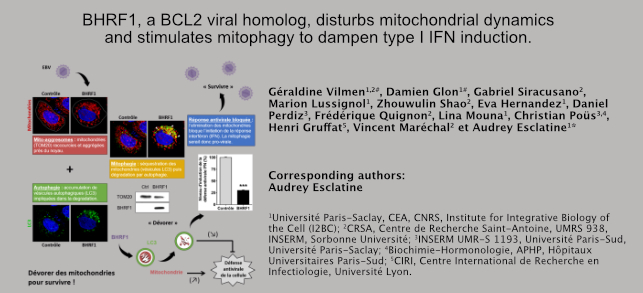BHRF1, mitophagy & antiviral response
Authors
Vilmen G, Glon D, Siracusano G, Lussignol M, Shao Z, Hernandez E, Perdiz D, Quignon F, Mouna L, Poüs C, Gruffat H, Maréchal V, Esclatine A
Link to the original articleYear of publication
2020
Journal
Autophagy
Abstract
Devour mitochondria to survive! When a viral protein induces mitophagy to inhibit antiviral defense. Mitochondria are organelles with many essential functions for cell survival and are involved in the induction of the cell antiviral defense. Viruses have developed strategies that allow them to subvert cellular machinery to their advantage to ensure their survival. We recently demonstrated how the BHRF1 protein, encoded by the Epstein-Barr virus (EBV), could improve the EBV persistence. EBV belongs to the Herpesvirus family, viruses that persist lifelong in the host due to their ability to lie dormant within a cell (viral latency). EBV is responsible for cancers, such as Burkitt lymphoma or nasopharyngeal carcinoma, and also for infectious mononucleosis. BHRF1 is a protein encoded by this virus, which has similarities to Bcl-2, a protein that regulates both apoptosis and autophagy. We have shown that BHRF1, in addition to its ability to block apoptosis, localizes at the mitochondrial membrane to disturb its functions. In fact, BHRF1 induces the fragmentation of mitochondria into smaller entities and their aggregation close to the nucleus: these are called mito-aggresomes. The formation of mito-aggresomes is the first step leading to mitophagy, a cellular process of selective degradation of mitochondria by autophagy. Our work demonstrated that BHRF1 stimulates autophagy, allowing sequestration of fragmented mitochondria in autophagic vesicles and thus ensure their degradation. This mitophagy is responsible for the inhibition of cell innate antiviral defense. In fact, mitochondria participate in early viral infection recognition, to allow the production of interferon (IFN), a key antiviral molecule. Thus, by destroying part of the mitochondrial pool, BHRF1 decreases the host defense by reducing the production of IFN, which could contribute to the pathogenesis of EBV.
Graphical abstract

BHRF1, a BCL2 viral homolog, disturbs mitochondrial dynamics and stimulates mitophagy to dampen type I IFN induction